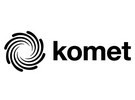In Groblersdal, Mpumalanga, farmer Hannes Schutte has recorded a 12% increase in potato yields after adopting smaller, precision-managed pivots and low-pressure sprinklers. The move has also reduced energy use by 60% through the introduction of solar-powered irrigation.
Schutte explains that potatoes are a high-risk crop requiring careful management of variety, land, and water. By moving from large pivot systems to smaller pivots of no more than 22 hectares each, he has been able to maintain greater control and react more quickly to plant stress and changing weather. Smaller pivots have also reduced downtime when equipment fails and allowed more frequent irrigation cycles during heatwaves.
 © Komet Irrigation
© Komet Irrigation
The farmer adopted low-pressure sprinkler systems through the local dealership, Loskop Valley Besproeiing. Schutte said these sprinklers provided more uniform droplet size, less misting, and better coverage at lower pressures. This reduced the number of pumps needed and lowered energy and water use while improving crop performance. Dealer support played a role in ensuring the correct application on his farms.
The case reflects a wider trend in South Africa, where grid instability, climate volatility, and sediment-heavy water supplies have led farmers to consider alternative irrigation strategies. Many are transitioning to solar energy to address loadshedding and power shortages. Low-pressure sprinklers that can operate effectively with reduced energy input are seen as a practical option in such conditions.
Industry representatives note that irrigation systems are increasingly being designed with these challenges in mind, including technologies to maximize coverage at low pressure. The broader sector is also focusing on water conservation, energy efficiency, and farmer training to support sustainable production under changing conditions.
 © Komet IrrigationFor more information:
© Komet IrrigationFor more information:
Annelle Whyte
Komet Irrigation
Email: [email protected]
www.kometirrigation.com
